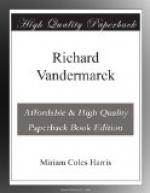And what was the cause of this sudden kindness? It is very easy for me to see now, though then I had not a suspicion. Alas! I am afraid that the cheeks aflame at breakfast-time were the immediate cause of the change. Mrs. Hollenbeck would not have made so marked a movement for an evening’s entertainment: it seemed to suit her very well that I should talk to the tutor in the library before breakfast, and she meant to give me opportunities for talking to him in the parlor too.
“A dreary evening, is it not?” she began. “What shall we all do? Charlotte, can’t you think of something?”
Charlotte, who had her own plans for a quiet evening by the lamp with a new book, of course could not think of anything.
“Henrietta, at least you shall give us some music, and Mr. Langenau, I am sure you will be good enough to help us; I will send over to the school-room for that flute and those piles of music that I’ve seen upon a shelf, and you will be charitable enough to play for us.”
“I must beg you will not take that trouble.”
“Oh, Mr. Langenau, that is selfish now.”
Mrs. Hollenbeck did not press the subject then, but made herself thoroughly delightful during tea, and as we rose from the table renewed the request in a low tone to Mr. Langenau: and the result was, a little after eight o’clock he came into the parlor where we sat. A place was made for him at the table around which we were sitting, and Mrs. Hollenbeck began the process of putting him at his ease. There was no need. The tutor was quite as much at ease as any one, and, in a little while, imperceptibly became the person to whom we were all listening.
Charlotte Benson at last gave up her book, and took her work-box instead. We were no longer moping and dull around the table. And bye and bye Henrietta, much alarmed, was sent to the piano, and her poor little music certainly sounded very meagre when Mr. Langenau touched the keys.
I think he consented to play not to appear rude, but with the firm intention of not being the instrument of our entertainment, and not being made use of out of his own accepted calling. But happily for us, he soon forgot all about us, and played on, absorbed in himself and in his music. We listened breathlessly, the others quite as much engrossed as I, because they all knew much more of music than I did. Suddenly, after playing for a long while, he started from the piano, and came back to the table. He was evidently agitated. Before the others could say a word of thanks or wonder, I cried, in a fear of the cessation of what gave me such intense pleasure,
“Oh, sing something; can’t you sing?”
“Yes, I can sing,” he said, looking down at me with those dangerous eyes. “Will it give you pleasure if I sing for you?”
He did not wait for an answer, but turned back to the piano.
He had said “if I sing for you,” and I knew that for me he was singing. I do not know what it was for others, but for me, it was the only true music that I had ever heard, the only music that I could have begged might never cease, but flood over all the present and the future, satisfying every sense. Other voices had roused and thrilled, this filled me. I asked no more, and could have died with that sound in my ears.




